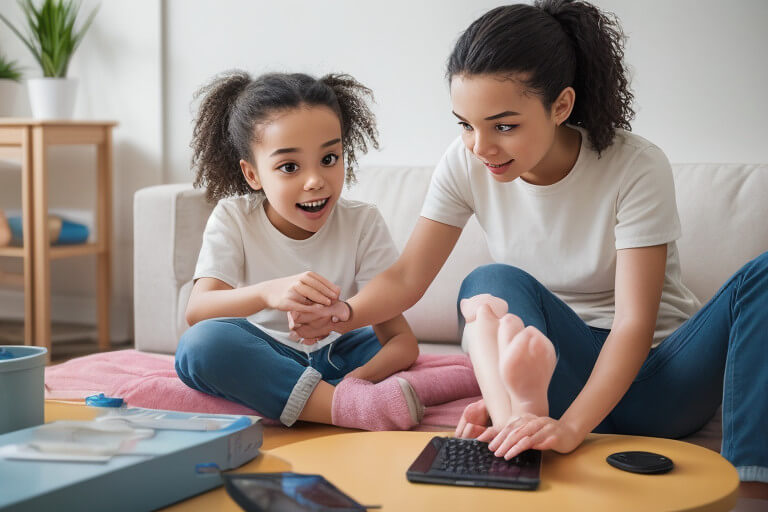Last updated on: Tuesday, 24 December 2024 09:07 PM (India Time)
life kit parenting screen time and your family
life kit parenting screen time and your family:- Discover effective strategies for managing screen time in your family. Learn how to create a balanced digital life for your children with practical tips and expert advice.
Managing Screen Time: A Parenting Guide for Your Family
In today’s digital age, managing screen time has become a significant challenge for many families. Balancing the benefits of technology with the need for physical activity, social interaction, and sleep is crucial for the healthy development of children. This guide provides practical strategies and expert advice to help parents create a balanced digital life for their family.
Understanding the Impact of Screen Time
Excessive screen time can have various effects on children, including:
- Physical Health Issues:
- Increased risk of obesity due to sedentary behavior.
- Strain on eyes and potential vision problems.
- Mental Health Concerns:
- Increased anxiety and depression.
- Sleep disturbances and reduced sleep quality.
- Cognitive and Social Development:
- Reduced attention span and difficulties in focusing.
- Impaired social skills due to less face-to-face interaction.
Setting Screen Time Limits
Establishing clear and consistent screen time limits is essential. Here are some guidelines to consider:
- Age-Appropriate Limits:
- Under 2 years: Avoid screen time, except for video chatting.
- Ages 2-5: Limit to 1 hour per day of high-quality programming.
- Ages 6 and older: Consistently enforce limits to ensure screen time does not interfere with sleep, physical activity, or other essential behaviors.
- Create a Schedule:
- Designate specific times for screen use, such as after homework or chores.
- Establish “screen-free” zones and times, such as during meals and before bedtime.
- Use Parental Controls:
- Utilize apps and device settings to monitor and control your child’s screen time.
- Ensure the content is age-appropriate and educational.
life kit parenting screen time and your family
Encouraging Alternative Activities
Promote activities that do not involve screens to ensure a balanced lifestyle:
- Physical Activities:
- Encourage outdoor play, sports, and family walks.
- Provide opportunities for physical exercise and active play.
- Creative Pursuits:
- Engage your child in hobbies such as drawing, reading, or playing musical instruments.
- Encourage imaginative play with toys and crafts.
- Social Interaction:
- Foster face-to-face interactions with family and friends.
- Plan family activities that involve cooperation and communication.
Role Modeling and Positive Reinforcement
Children often imitate their parents’ behavior. Set a positive example by managing your own screen time:
- Be a Role Model:
- Demonstrate balanced screen use by prioritizing family time and other activities.
- Avoid excessive use of devices in front of your children.
- Reward Positive Behavior:
- Use positive reinforcement to encourage your child to follow screen time rules.
- Offer rewards for engaging in non-screen activities, such as extra playtime or a special outing.
Creating a Family Media Plan
A family media plan can help establish clear guidelines and expectations for screen use:
- Involve the Whole Family:
- Discuss the importance of balanced screen time with your children.
- Collaborate to create rules and limits that everyone agrees on.
- Set Clear Rules:
- Define acceptable screen time activities and duration.
- Establish consequences for not following the rules.
- Review and Adjust:
- Regularly review the family media plan and make adjustments as needed.
- Stay flexible and open to changes based on your family’s needs and circumstances.
Utilizing Educational Content
Not all screen time is detrimental. Educational content can be beneficial for learning and development:
- Choose High-Quality Content:
- Select educational programs, apps, and games that promote learning.
- Use trusted sources to find age-appropriate and educational media.
- Co-View and Discuss:
- Watch programs and play games with your child to provide guidance and context.
- Discuss the content to enhance understanding and critical thinking.
Final Thoughts
Balancing screen time in your family requires consistency, communication, and creativity. By setting clear limits, encouraging alternative activities, and modeling positive behavior, parents can help their children develop healthy screen habits. Remember, the goal is not to eliminate screens but to integrate them in a way that supports your child’s overall well-being and development.
Creating a balanced digital life is a continuous process that involves regular adjustments and open dialogue. With these strategies, you can navigate the digital landscape and ensure that screen time becomes a positive and enriching part of your family’s life.

👨💼 Sonu Maurya
Founder & Chief Editor at LifestyleNo1.com — a trusted skincare and beauty review platform. Sonu shares honest skincare product reviews, ingredient breakdowns, and lifestyle guides to help readers make better beauty choices.

